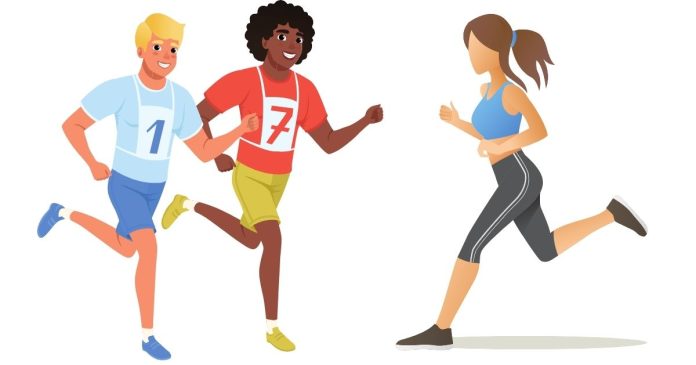Running a 5K (5 kilometers or 3.1 miles) is one of the most popular race distances for runners of all experience levels. It’s long enough to challenge your endurance but short enough to be achievable with consistent effort. Whether you’re new to running or a seasoned athlete, you might wonder: What’s a good average time to run a 5K?
In this blog post, we’ll break down average 5K times by experience level, factors affecting performance, and tips to improve your time.
Average 5K Times by Experience Level
Your 5K time will depend on your fitness level, running experience, and goals. Here’s a breakdown of average 5K times by category:
1. Beginners
- Average Time: 30–40 minutes
- Pace: 9:40–12:50 per mile (6:00–8:00 per kilometer)
- Description: New runners often start with a mix of running and walking, gradually building endurance. Completing the race comfortably is the primary goal.
2. Intermediate Runners
- Average Time: 22–30 minutes
- Pace: 7:05–9:40 per mile (4:24–6:00 per kilometer)
- Description: Regular runners with some experience may aim to break the 30-minute mark and work on pacing and consistency.
3. Advanced Runners
- Average Time: 16–22 minutes
- Pace: 5:10–7:05 per mile (3:13–4:24 per kilometer)
- Description: Advanced runners, often with competitive goals, focus on speed and efficiency.
4. Elite Runners
- Average Time: Under 16 minutes (Men) / Under 18 minutes (Women)
- Pace: Sub-5:10 per mile (3:13 per kilometer)
- Description: Elite runners, including professionals, train rigorously to achieve these times.
Factors That Affect 5K Performance
Several factors influence how quickly you can complete a 5K:
1. Fitness Level
Your cardiovascular fitness, muscular endurance, and overall health play a significant role in your running performance.
2. Age
- Younger runners, particularly those in their 20s and 30s, often achieve faster times due to peak physical performance.
- However, many older runners maintain excellent times through experience and consistent training.
3. Gender
On average, men tend to run faster than women due to differences in physiology, such as muscle mass and lung capacity.
4. Terrain and Weather
- Terrain: Flat courses tend to yield faster times, while hilly or uneven trails may slow you down.
- Weather: Ideal running weather is cool and dry. Extreme heat, cold, or wind can impact performance.
5. Training and Preparation
Consistent training, proper hydration, and nutrition are essential for improving your 5K time.
How to Measure Your 5K Progress
1. Track Your Time
Use a stopwatch, fitness tracker, or running app like Strava or Runkeeper to record your time.
2. Calculate Your Pace
Pace is the time it takes to run one mile or kilometer. To calculate:
Pace=Total TimeDistance\text{Pace} = \frac{\text{Total Time}}{\text{Distance}}
3. Compare With Benchmarks
Compare your times with average benchmarks for your age group and experience level to gauge progress.
Tips to Improve Your 5K Time
If you want to run a faster 5K, here are some effective strategies:
1. Incorporate Interval Training
- Alternate between high-intensity running and recovery periods.
- Example: Run at a fast pace for 1 minute, then jog or walk for 2 minutes.
2. Build Endurance
- Add longer runs to your weekly routine to improve stamina.
- Gradually increase your distance to enhance your aerobic capacity.
3. Strength Train
- Strengthen your legs, core, and glutes to improve running efficiency and reduce injury risk.
- Focus on exercises like squats, lunges, and planks.
4. Work on Pacing
- Practice running at a consistent pace to avoid burning out early in the race.
- Use a GPS watch or app to monitor your splits.
5. Rest and Recover
- Incorporate rest days to allow your body to repair and adapt.
- Use foam rolling and stretching to prevent stiffness and soreness.
6. Optimize Race Day
- Warm Up: Do dynamic stretches and a light jog before starting.
- Fuel Properly: Eat a light meal 2–3 hours before the race.
- Hydrate: Stay hydrated in the days leading up to the race.
Setting Realistic Goals
Your 5K goal should reflect your current fitness level and aspirations. For beginners, finishing the race may be the primary goal. More experienced runners may aim to beat a personal record (PR) or target a specific time.
Conclusion
A “good” 5K time is relative—it depends on your personal fitness level, goals, and experience. For some, completing the race is an achievement, while others may focus on shaving seconds off their PR. No matter where you fall on the spectrum, running a 5K is a rewarding challenge that encourages growth and celebrates progress.
What’s your personal best 5K time? Share your experiences, tips, and goals in the comments below!



